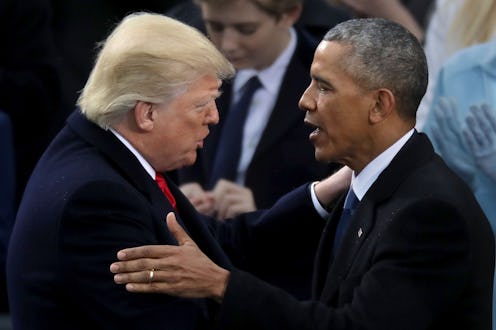News
The Laws Trump Vs. Obama Passed In Their First Two Years In Office Are Nothing Alike

We're two years into Donald Trump's presidency, and during that time, he's often bragged about how much legislation he's passed. Although some of those claims have been patently false, and a quick comparison of Trump and Barack Obama's legislative achievements shows that Trump, at the two year mark, is trailing his predecessor in terms of significant bills signed into law.
To be sure, both presidents signed plenty of small or moderate pieces of legislation — the kind that renewed existing laws, renamed post offices, and that kind of thing. Moreover, exactly what constitutes a "significant" piece of legislation will always be a matter of debate.
Nevertheless, it would be difficult to argue that Trump's legislative accomplishments in his first two years come close to those that Obama signed during the same period of time. Let's take a look.
Obama passed several huge and historic pieces of legislation during his first two years. The most obvious of them is the Affordable Care Act, which extended health coverage to 20 million Americans and, more broadly, fundamentally changed the way in which Americans receive health care. Eight years after its passage, it continues to be one of the most talked-about laws in American politics; some have argued that Republican Senate candidate Martha McSally lost her 2018 campaign, in part, because of her votes to repeal the law years earlier.
But Obamacare isn't the only big piece of legislation Obama signed during his first two years in office. Just nine days after being inaugurated, he signed the Lilly Ledbetter Fair Pay Act into law, which made it significantly easier for workers to sue their employers for wage discrimination. Less than a month later, Obama signed the American Recovery and Reinvestment Act, more casually known as the stimulus package, injected $831 billion into the American economy in a (successful) attempt to prevent a depression after the financial collapse months earlier.
Similarly, in 2010, Obama signed the Dodd-Frank Wall Street Reform and Consumer Protection Act. This was a financial reform bill intended to reign in the Wall Street excesses that many blamed for the 2008 financial crisis. As with the Affordable Care Act, it was criticized by conservatives for being too liberal and, likewise, by liberals for being too conservative. Nevertheless, Dodd-Frank resulted in the creation of the Consumer Financial Protection Bureau, the first government agency dedicated to protecting consumers from predatory financial practices.
During the lame duck session after the 2010 midterms, Obama managed to sign a few more pieces of major legislation into law: The repeal of Don't Ask, Don't Tell, which had banned LGBTQ Americans from serving openly in the military, and the extension of George W. Bush's tax cuts for the richest Americans.
So, how does Trump stack up?
The biggest piece of legislation signed by Trump during his first two years is the Tax Cuts and Jobs Act. A highly regressive tax cut, the law cut the corporate tax rate by 15 percent, slashed the income tax rate for top earners by 2.6 percent primarily, and implemented several other changes that, in totality, primarily benefited the wealthiest Americans.
That's the only bill Trump has signed that, in terms of scope and consequence, could reasonably be compared to the Affordable Care Act or Dodd-Frank. However, he has signed a few smaller laws that are worth noting.
In August 2017, Congress passed a bill that both imposed new sanctions on Russia and restricted Trump's ability to ease existing sanctions. When it landed on his desk, the White House called it "clearly unconstitutional" and said that it "purport[s] to displace the President's exclusive constitutional authority to recognize foreign governments, including their territorial bounds." However, Trump signed it into law anyway.
Trump also signed bills to provide relief money after various natural disasters and make it easier for the Secretary of the Department of Veterans Affairs to fire employees at that agency. And that's about it.
To be sure, signing legislation isn't the only way a president can leave their mark on America. Confirming judges, creating or eliminating regulations, appointing agency heads, issuing pardons, exercising prosecutorial discretion, choosing which lawsuits to defend and making foreign policy decisions are all other ways for presidents to affect change, and Trump has done many of those things, often with significant consequences.
In terms of signing legislation, however, Trump is not a force to be reckoned with — and any honest account of his first two years would conclude that, in terms of legislation, he's had a far smaller influence so far than Obama did at the same point in his presidency.